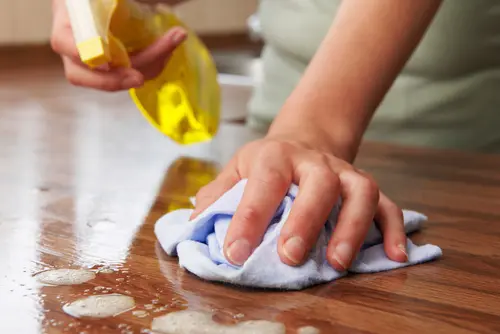Maintaining proper hygiene is of utmost importance when it comes to food processing. To promote hygiene and prevent poisoning or other diseases spreading by way of food, we must continuously and adequately clean and disinfect the surfaces that come in contact with food.
The sanitizing process is essential to ensure your and your family’s health and well-being. Your determination to disinfect your home like a pro and sanitize every room thoroughly will be awarded with a better and safer living environment.
However, cleaning on such a scale is no small task, and people often feel overwhelmed, overworked or simply exhausted to take the time out of their busy schedules to clean. To save your time and energy, you can hire a good maid service in Kansas City. With dangerous viruses lurking around the corner, it’s crucial that you stay on top of your cleaning game!
How do you clean and sanitize food contact surfaces?
Any surface that comes into contact with food, including tools and appliances, tableware, countertops, tables, etc. needs to be properly cleaned and sanitized to prevent illness, as well as to minimize food waste. Restaurant owners know this better than anyone.
When choosing a material for kitchen counters, it’s a good idea to choose a nonporous, smooth one, because this type of surface can be cleaned more easily. Wood sure looks nice, but it’s somewhat difficult to clean, unless you use specific cleaning methods and products.
If you’re one of those people who simply can’t resist wood’s natural charm, here’s how to clean wooden surfaces and equipment:
- Rinse with water
- Scrub with soap and a rough bristle brush
- Rinse well with clean water
- Let air dry
- Sanitize when needed
Cleaning vs. disinfecting food contact surfaces
Cleaning physically removes dirt, grime and germs from a surface with the help of a detergent and other cleaning supplies. Regular cleaning prevents biofilm from forming, which stops germs from occupying the surface and protecting themselves from the brush in future.
Sanitizing lowers the numbers of living microorganisms on the surface, and it works best on clean surfaces, which means you should always clean before you sanitize. When it comes to cleaning surfaces that are in close contact with food, check the label on your sanitizer to see if it’s approved for use on food contact surfaces.
Is rubbing alcohol safe on food surfaces?
When preparing food, any of the sanitizers you use on the surfaces should be long evaporated, otherwise there would be risk of pesticides poisoning the food. Just to be safe, you should always choose sanitizers that are approved for use with food by the manufacturer and EPA.
These include chlorine, iodine, peroxyacetic acid, and quaternary ammonium or quats, all of which can be obtained in different concentrations and diluted with drinkable water to make the solution milder.
And one more thing: if you’re used to using your phone while having lunch, remember that it can act as a magnet for all kinds of microbes, so remember to clean smartphones and other electronic devices daily.
 Top-of-the-line maid service in Kansas City will make your home shine
Top-of-the-line maid service in Kansas City will make your home shine
Staying on top of time-consuming household chores doesn’t have to be your job. Here at Sunflower Maids we’re more than happy to help improve your quality of life by sending capable and meticulous expert cleaners your way.
Why not reclaim your freedom and your free time? You could take the kids to one of the amazing pop-ins of the Kansas City Public Library for a fun day full of stories and imagination. What you won’t have to imagine is a clean and fresh home, as it’ll be waiting for you when you get back.
A thoroughly clean home is but a call away. Book now!

 Top-of-the-line maid service in Kansas City will make your home shine
Top-of-the-line maid service in Kansas City will make your home shine